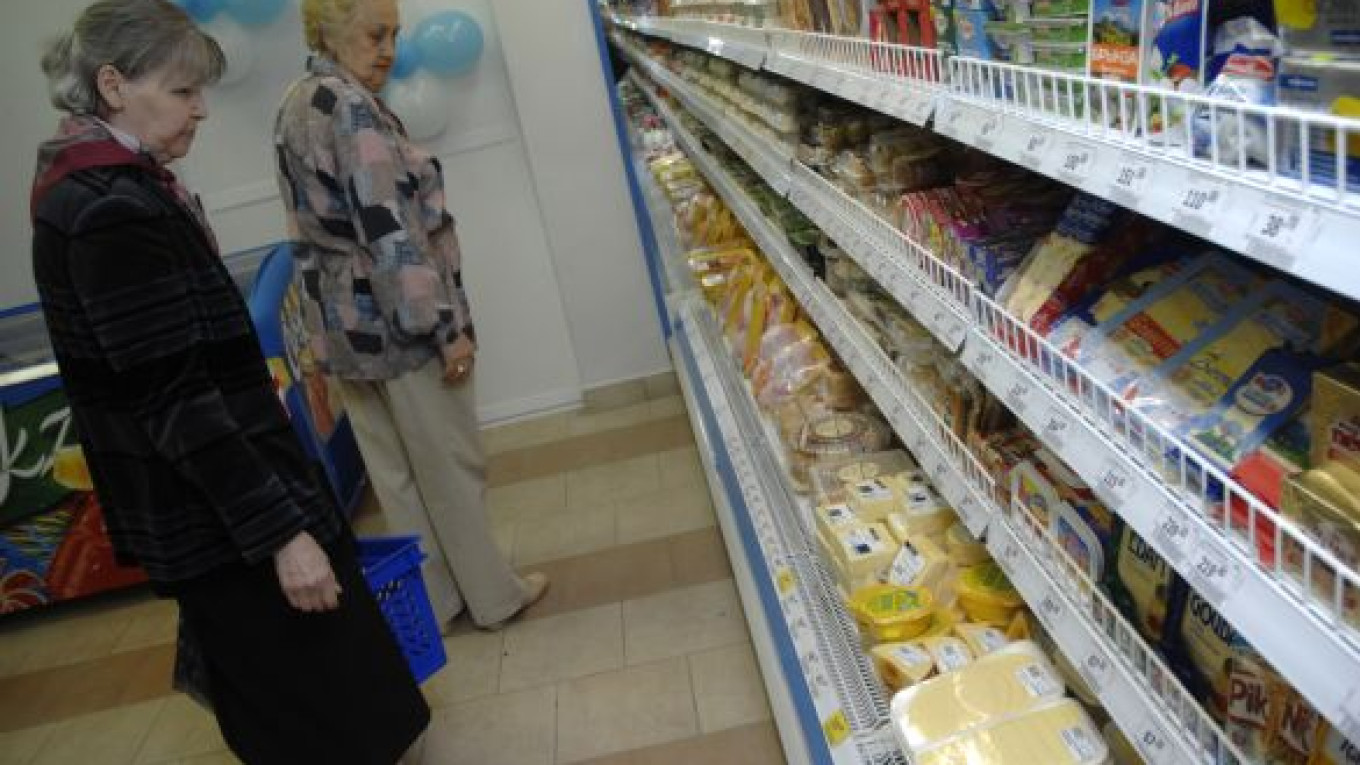A proposed law on trade has caused a falling-out not only between retailers and suppliers, but between the Cabinet and presidential administration as well.
The administration of President Dmitry Medvedev has criticized the version of the law approved by First Deputy Prime Minister Viktor Zubkov, overturning nearly all of its bedrock provisions, but the government is undeterred and is sticking to the bill.
The State Duma passed the legislation on trade in a first reading only after Prime Minister Vladimir Putin personally intervened. It is to be considered in a second reading Wednesday.
The bill forbids retailers from extracting so-called bonuses — extra fees paid by suppliers to get their goods onto retailers’ shelves. Instead they would only be able to charge volume premiums of up to 10 percent. It would also introduce strict payment periods for retailers and prohibit retail chains from opening new stores in municipal districts where they would gain a market share of more than 25 percent.
The document was approved by Zubkov in the beginning of November, and on Dec. 2 the State Duma’s Economic Policy and Entrepreneurship Committee recommended that the bill be passed in the key second reading.
But the presidential administration’s State Legal Directorate gave the bill a negative review, a United Russia deputy in the Duma committee told Vedomosti. The second reading of the bill has been delayed for an undefined period, the deputy said. Zubkov said Tuesday that the bill would be passed in a second reading Wednesday as planned.
“The bill hardly even touches issues of protecting the rights and interests of the consumer, although that is its proclaimed goal,” the directorate said in a presentation, seen by Vedomosti.
The directorate criticized nearly all of the bill’s basic provisions. It said limiting retailer premiums to 10 percent contradicts the principle of freedom of contract, and the economic logic is faulty as well: Increasing sales is in the interest of producers, and they have the right to pay for it.
And the idea to prohibit sales of goods at prices lower than procurement is “dubious from a legal standpoint,” the directorate said in a presentation, adding that this falls within the purview of anti-monopoly legislation anyway.
Alexei Popovichev, managing director of RusBrand, said the directorate’s remarks are fair. “Bonuses give additional instruments for stimulating retail chains as well as the chance for suppliers to compete among themselves,” he said.
Payment periods should depend on the good’s expiration date, but the legislation has incomprehensible exceptions, the directorate said. As an example, frozen beef, pork, chicken meat and milk must be paid for within 10 days, according to the bill. “This proposition purposefully puts certain producers and suppliers in a very profitable position,” the directorate said.
There are no grounds for including frozen meat and milk in the group of products with an expiration period of less than 10 days, said Akin Bayer, CEO of Metro Cash & Carry Russia. He said the expiration period for frozen products is several months.
The prohibition on retail chains acquiring new stores if their market share would exceed 25 percent is inappropriate, the directorate said. The prohibition shouldn’t be absolute, and exceptions, introduced by the government or president, should be taken into account, otherwise residents of small municipalities may suffer, it said. Sergei Galitsky, co-owner of Magnit, said this provision was the one most damaging for business.
Presidential aide Arkady Dvorkovich said all the remarks made by the presidential administration on the bill are conceptual.
But the government “continues to work from the version of the bill approved by Zubkov in the beginning of November, said Deputy Industry and Trade Minister Stanislav Naumov, who will participate in the White House’s conciliation commission. Dmitry Peskov, Prime Minister Vladimir Putin’s spokesman, said such disagreements were part of “the typical work process.”
The arguing sides are united in a certainty that the bill will be passed by the end of the year. Yevgeny Fyodorov, chairman of the Duma’s Economic Policy and Entrepreneurship Committee, said the bill would probably be passed Dec. 11, while Dvorkovich said introducing the changes made by the directorate would require seven to 10 days. Peskov said only that “a compromise will be found.”
“In the first reading, the bill was passed with the same conclusions from the directorate, but the position of the government has remained unchanged,” said Sergei Lisovsky, a senator and co-owner of Mosselprom.
If the administration came out against the law, then certain provisions would certainly be amended, said Anton Danilov-Danilyan, chairman of the expert council of Delovaya Rossia.
A Message from The Moscow Times:
Dear readers,
We are facing unprecedented challenges. Russia's Prosecutor General's Office has designated The Moscow Times as an "undesirable" organization, criminalizing our work and putting our staff at risk of prosecution. This follows our earlier unjust labeling as a "foreign agent."
These actions are direct attempts to silence independent journalism in Russia. The authorities claim our work "discredits the decisions of the Russian leadership." We see things differently: we strive to provide accurate, unbiased reporting on Russia.
We, the journalists of The Moscow Times, refuse to be silenced. But to continue our work, we need your help.
Your support, no matter how small, makes a world of difference. If you can, please support us monthly starting from just $2. It's quick to set up, and every contribution makes a significant impact.
By supporting The Moscow Times, you're defending open, independent journalism in the face of repression. Thank you for standing with us.
Remind me later.


